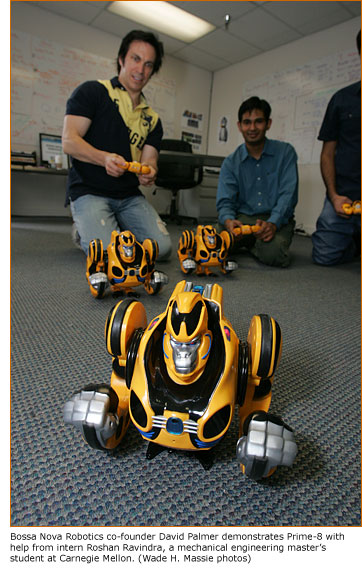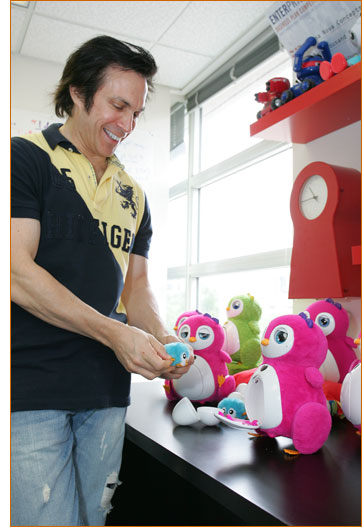
- Pittsburgh's Bossa Nova Robotics takes the fun factor of high technology very seriously.
"Oh, he's practicing his backstroke," David Palmer says as he watches Prime-8, a robotic toy ape, swim across the office floor into a wall. "He wants to be in the Olympics. He wants to be Michael Phelps."
Palmer sets the squat, yellow-and-black robot upright. But Prime-8 totters over and growls. "I'm sorry," Palmer says. After Prime-8 rights himself, he uses his massive forearms to zip across the floor. The arms work like wheels, giving Prime-8 speed and traction. This robot can run over wood, carpet, tile or grass.
"Normally, (robots) need either big feet or expensive sensor technology to balance," says Sarjoun Skaff (CS'01,'07), one of the founders and chief technology officer of Bossa Nova Robotics, based on South Craig Street near the Carnegie Mellon campus. "We have Prime-8, and he's special because he can balance without any sensors--he balances on his arms."
Skaff and Palmer believe Prime-8--on sale now at Amazon.com and at Bossa Nova's Web site--is the fastest toy robot on the market. And they might be right. Right now, three Prime-8s are dancing in circles before tumbling over, flipping on their backs and then standing on their heads. Their legs kick up and down.
"Mobility is important because you react differently to things that move than to things that are static," Skaff says. "You relate to robots through interaction."
The idea for mass-marketing robots came to Skaff while he was a grad student in robotics at CMU. One day, as he was testing a six-legged robot called RHex on campus, a group of kindergarten students surrounded it. At first, the kids were frightened of the skittering robot. Then, while most of the children shrieked, one boy picked up a stick to prod at the creature. The brave boy inched closer until he finally touched RHex.
Soon the children started playing with RHex as if he were a dog.
"It was a catalyst" for the creation of Bossa Nova, Skaff says. "From the beginning, I wanted to share robots with the public because I think they're very cool," but unfortunately, relatively few robots have been developed for sale to the general public because of the cost of manufacturing them.
To create affordable robots for the mass market, Bossa Nova is using expertise developed at the Robotics Institute to keep manufacturing costs low and make its robots compelling. While Bossa Nova's first products are for entertainment purposes, Palmer and Skaff hope to some day create personal robots for tasks like education and personal assistance.
"We're demonstrating we know how to design and manufacture products that people want," Skaff says. "We are building on this phase to perhaps offer richer applications targeted to other environments--education, companionship, healthcare."
Most robots advanced enough to be used in education have been unaffordable for average students, Skaff says, so Bossa Nova is looking at inexpensive robots for use in classrooms as a teaching tool. "Hopefully, it would make kids excited about science and technology," he says. "If you write a program for a robot, and you can touch it, see it and share it, the result makes computer programming more interesting. You would see what sensors are used for and likewise, you would learn about robots, how they plan to move, how they recognize spaces and places, and map their environment."
In addition to Prime-8, Bossa Nova has developed a toy for younger children--a pink penguin named Penbo. She waddles like a real penguin, and as Palmer talks to her, Penbo sings "Hello."
"She hears my voice," he says. Palmer rubs Penbo's head and she coos and purrs. She dances and her penguin feet seem to propel her the same way as Prime-8's arms.
As she chatters happily, Palmer touches a heart on her chest, and slowly, a door in her belly opens and an egg emerges. Palmer opens the egg and a fuzzy blue penguin pops out. Immediately, Penbo begins burbling at the baby, and when he moves the little penguin too far away, Penbo searches for her hatchling. Children can play hide and seek with Penbo and her baby.
Penbo is also available from Amazon, and Palmer says Bossa Nova hopes to have the penguin and Prime-8 on sale at major, big-box retailers by next Christmas.
And he says both product lines will be expanded, so children can expect more toy robots that will be fun to play with, and which can interact with one another.
Penbo and Prime-8 are more than just toys, Skaff says. They're a way for children to relate to technology. "Children are having fun with it, learning from it, projecting their imagination on it," he says. "And we're giving them an interesting experience that's based on advanced robotics."
Meghan Holohan is a Pittsburgh-based freelance writer who contributes regularly to The Link. She also blogs frequently for MentalFloss.com.
Image2:

For More Information:
Jason Togyer | 412-268-8721 | jt3y@cs.cmu.edu

